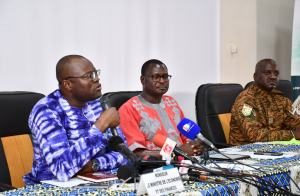Burkina Faso / Constitutional review: What is the Burkinabe Society of Constitutional Law (SBDC) complaining about?

The Constitutional Council formalized the modification of the constitution on Friday, January 12, 2024, after the project was voted on by the majority on December 30, 2023, at the Transitional Legislative Assembly (ALT).
On Saturday, January 13, 2024, the renowned Burkinabe Society of Constitutional Law (SBDC) took a stand to first question the procedure to assess the regularity of the constitutional revision and then challenge the established modifications.
«Regarding regularity, according to Professor Abdoulaye Soma, the Constitutional Council did not consider the respect for the consultation and appreciation phase, even though it is a completely autonomous phase of the constitution’s adoption».
Today, the SBDC, not to mention the Superior Council of the Judiciary (CSM), because they are birds of the same feather, laments being ignored during the consultation phase.
Why consult the CSM if it is known in advance that nothing objective will result from it?
The Superior Council of the Judiciary seriously lacks credibility in light of the actions of certain magistrates who have deliberately transformed the Court of Justice into a «Business Center» where the underprivileged have no say, regardless of the nature of the case.
In any case, what irritates the CSM is not the lack of consultation but the significant innovations introduced by the modified constitution.
These innovations mainly focus on the reorganization of the composition of the CSM itself.
It will now include non-magistrate personalities, and its president will be elected by its members.
Additionally, individuals sitting on the governing body of a trade union or association of magistrates, as well as those involved in the leadership of a political party or formation, will be excluded.
The modified Constitution also allows for the appointment of public prosecutors and the establishment of disciplinary and career chambers.
The judiciary has become a shadow of itself, with numerous scandals.
And no serious government, whether from a transition or not, can allow such things to prosper if it genuinely wants to establish a new foundation for strengthening democratic culture and consolidating the rule of law.
All in all, the holding of this debate can no longer influence the decision of the Constitutional Council because, according to Article 159 of the Burkinabe Constitution: «The decisions of the Constitutional Council are not subject to any appeal. They are binding on public authorities and all administrative and judicial authorities». The directive remains the same.
Cedric KABORE












